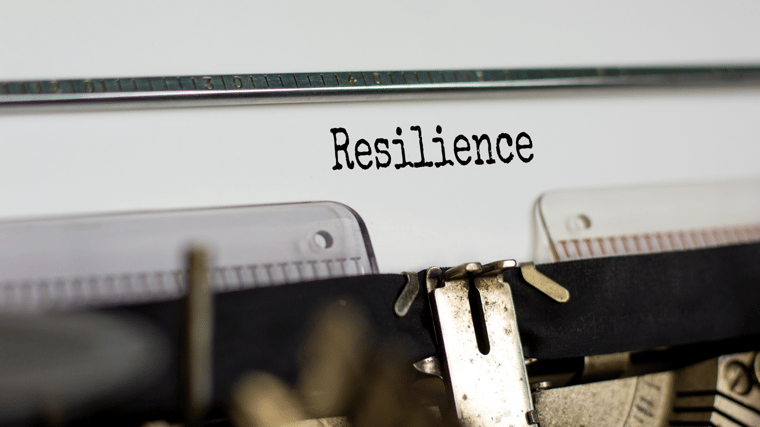Where would we be today without light bulbs? Perhaps in the dark, if not for Thomas Edison’s resilience. Edison made 1,000 unsuccessful attempts trying to invent the light bulb. He told a reporter, “I didn’t fail 1,000 times—the light bulb was an invention with 1,000 steps.”
Resilience is all about perspective and mindset. Edison continued despite being ridiculed. He visualized the long-term goal and knew his efforts and persistence would eventually pay off.
What makes a highly resilient person? Carol Dweck, a psychologist at Stanford University, coined the term, growth mindset. With a growth mindset, you believe that defeat happens for and not to you. Success and failure go hand in hand to help you achieve your goals.
According to Dweck, a growth mindset involves:
- Finding reasons to be optimistic
- Understanding what you don’t want
- Accepting challenges as opportunities to grow and learn
Can the habits be learned?
Absolutely! Resilience is a skill set that strengthens throughout our lives. With dedication, you can turn healthy practices into lifelong habits to meet your goals. The process of building the habits of resilience is like a health and wellness journey. Both journeys are lifelong pursuits. Over time the roadblocks and goals change focus. This is fine and to be expected. The journey is about learning, facing challenges, and growing into the person you wish to be.
To help you stay on track along the way, creating an action plan is imperative. After your action plan is in place, share your progress with a co-worker, friend, or family member. Having a trusted supporter will hold you accountable. They can also offer new perspectives and encouragement. According to James Clear, author of Atomic Habits, give yourself several weeks to incorporate the new habit into your routine. This gives you time to build the habit. Habits take time, but results do come. The time investment and commitment are worth the results.
What does resiliency look like today?
According to Gartner, organizations face historic challenges. With a competitive talent landscape, an exhausted workforce, and pressure to control costs due to the state of the economy, success takes more than hard work. In today’s competitive business environment, you must be resilient and recover quickly from these obstacles. Developing resilience and having a growth mindset is critical to successfully planning and executing your strategic plan to navigate forward.
What are the habits of highly resilient people?
Although this is not an exhaustive list, here are 5 habits of highly resilient people:
- They practice mindfulness.
Resilient people deeply know themselves and are truthful about their strengths and weaknesses. They acknowledge their abilities and struggles. They know what they want. When practicing mindfulness, the focus is on deliberately paying attention to thoughts without judgment and achieving mental clarity. Resilient people do not allow obstacles or people to stand in the way of meeting their goals. The challenges they’ve faced and overcome are not forgotten. For instance, so many were furloughed or lost their jobs during the pandemic, and with resilience and a growth mindset, they persevered and now recognize they can face future challenges head-on. This comes from their strong inner strength to defeat challenges and even criticism. - They focus on long-term goals.
Resilient people have a strong sense of purpose in life. Their growth mindset is apparent. They practice self-control and pass up other opportunities to maintain their focus on achieving their long-term goals. Resilient people surround themselves with like-minded supporters. They will find ways to reach their long-term goals, such as learning a new skill. - Resilient people think rationally and not emotionally.
Is this situation the end of the world? Resilient people think before they react. They don’t get derailed by negative environments or people. Their self-confidence drives their decisions. If they don’t know new technology, they’ll figure it out and embrace the learning process. They see setbacks as opportunities to grow and learn. - They know how to embrace change.
Resilient people see the positive side of change, not the obstacles or disappointment. Their past experiences, personal successes, and failures empower them to embrace change. They can handle whatever comes their way. Flexibility, adaptability, and confidence are several of their key traits. They see change as one step closer to their long-term goals rather than one step backward. - They protect their peace.
They fully understand that self-care is necessary for both an optimistic, goal-oriented mindset and the energy and strength needed to face challenges. Rest is part of their lifestyle habits including ways to recharge, such as exercise, hobbies, and sports. Resilient people celebrate their wins and understand that setbacks also play a critical role in their growth mindset. They practice positive self-talk and gratitude. They are kind to themselves and others. Resilient people are their own cheerleaders, but they also have a strong, loyal support system of family, friends, and co-workers.
Embracing the habits of highly resilient people
Remember to let go of negative thinking. It’s important to truly understand what’s holding you back from your goals. Accept failure and setbacks as a step in the right direction to meeting your goals. Maintaining a future-focused mindset and seeing problems as challenges to overcome will lead you to solutions. Understand roadblocks will happen, and that’s where resilience builds. Always maintain a growth mindset. Every time a setback happens, know you’ll get stronger and one step closer to your goal.
Explore Blue Ocean Brain’s award-winning content to learn more about building resilience. Our training helps develop soft skills around the key attributes of resilient people through approachable, accessible bites. For more resources, check out these free lessons on resilience, embracing change, and other important skills for today’s workforce!




